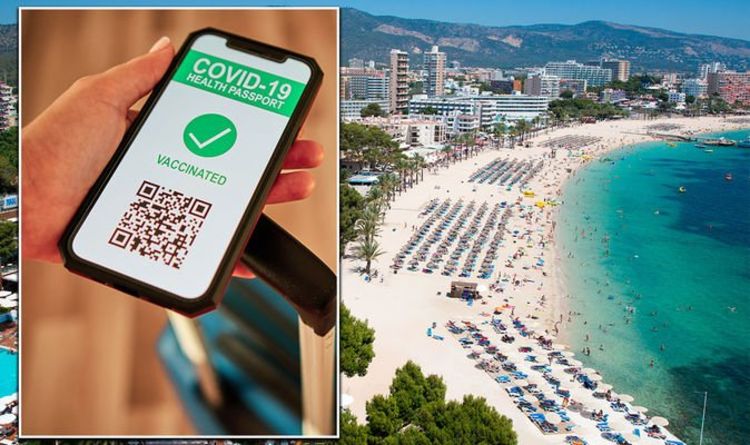Spain holidays: FCDO issues update on travel to Spain – how will you be affected?
Omicron: International travel restrictions criticised by expert
We use your sign-up to provide content in ways you’ve consented to and to improve our understanding of you. This may include adverts from us and 3rd parties based on our understanding. You can unsubscribe at any time. More info
The discovery of a new coronavirus “variant of concern”, Omicron, has seen countries hastily ramping up coronavirus restrictions both domestically and at borders. For Spain, this means arrivals who are not fully vaccinated are now no longer able to visit unless they have an “essential” reason.
The Spanish Government announced changes for UK arrivals which came into force on December 1, 2021.
Spain’s tourism board has stated that “all travellers from the United Kingdom will need to show proof of being fully-vaccinated (with both doses of a two-dose vaccine or one dose of a one-dose vaccine) at least 14 days prior to arrival in Spain.”
In line with this latest change, the Foreign, Commonwealth and Development Office (FCDO) has issued new travel advice for Britons.

What is the latest travel advice from the FCDO?
The latest update on the FCDO’s Spain travel page outlines “updated information on changes to entry requirements to Spain”.
The FCDO states: “The Spanish government requires all arrivals to Spain from the UK (excluding children under the age of 12 years old) to present on entry proof of being fully vaccinated (with both doses of a two-dose vaccine or one dose of a one-dose vaccine) at least 14 days prior to arrival in Spain (date(s) of vaccination must be specified), with a vaccine authorised by the European Medicines Agency or by the World Health Organisation.”
All passengers, including children under 12, travelling by air or sea must complete an online Health Control Form in the 48 hours before arrival.
The FCDO states that “Spain will accept the UK’s COVID-19 vaccination record.”
DON’T MISS
World War Three: Safe countries with bunkers as Russia tests missiles [INSIGHT]
Spain, Portugal, Turkey & US: What are the new tightened border rules? [UPDATE]
Worst city in the world for expats [RANKING]
Passengers travelling with a printed PDF proof of vaccination status must ensure it is dated from November 1 to ensure that the certificate can be scanned successfully.
Unvaccinated travellers are only permitted to enter Spain if they are legal residents or are travelling for an “essential” reason as categorised by the Spanish Minister of Health.
Passengers who have an essential reason to travel, but are not vaccinated, must show “documentation certifying that you have undertaken a COVID-19 nucleic acid amplification (NAAT) test (e.g. PCR, TMA, LAMP or NEAR) within 72 hours prior to arrival in Spain, or an antigen test taken within 48 hours of arrival, and tested negative.”
In some parts of Spain, regardless of the country of origin, tourist accommodation providers will require either evidence of being fully vaccinated or a negative test in order to check-in.
This is currently in place in the Canary Islands.

For those who are planning to travel, the FCDO is warning Britons to “be prepared for your plans to change”.
The travel authority adds: “No travel is risk-free during Covid. Countries may further restrict travel or bring in new rules at short notice. For example, due to a new COVID-19 variant.
“Check with your travel company or airline for any transport changes which may delay your journey home.
“If you test positive for COVID-19, you may need to stay where you are until you test negative. You may also need to seek treatment there.”
What domestic restrictions are in place in Spain?
Public health measures remain in place across Spain but may vary between regions.
The FCDO states that the most common rules include “handwashing hygiene, air ventilation rules and the use of face masks in enclosed public spaces and in some specific scenarios outdoors”.
It adds: “Regional governments retain legal powers to ease or tighten restrictions within their region if deemed necessary to control the spread of the virus, for example, partial lockdowns; limiting the capacity and opening hours of retail, hospitality establishments and public events.”
Source: Read Full Article



